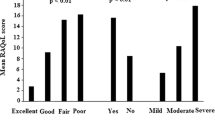Abstract
Although the Health Assessment Questionnaire (HAQ) and the Modified Health Assessment Questionnaire are useful tools for assessing and monitoring patients with rheumatic diseases, they have a “floor effect” and do not fully reflect the psychological status of patients. Recently, the Multidimensional Health Assessment Questionnaire (MDHAQ) was developed to overcome these shortcomings. We translated the MDHAQ into the Korean language and evaluated its reliability and validity for use with Korean-speaking patients with rheumatoid arthritis (RA). The questionnaire was translated into the Korean language by three translators, who were aware of its objectives, and it was translated back into the English language by three different translators. One question was modified to reflect Korean culture, and imperial measures were changed to metric measures because most Koreans use the metric system. The Korean MDHAQ was administered to 136 patients with RA who were attending the outpatient rheumatology clinic at the Chonnam National University Hospital (Gwangju, South Korea). Test–retest reliability was assessed in 101 patients after 1 week. To assess criterion validity, we compared MDHAQ scores with HAQ scores and the American College of Rheumatology (ACR) functional class. To test construct validity, the MDHAQ was compared to ACR core criteria (tender and swollen joint count, pain, patient's global assessment, physician's global assessment, erythrocyte sedimentation rate, and C-reactive protein), the Beck Depression Inventory (BDI), and the State–Trait Anxiety Inventory (STAI). The test–retest reliability was analyzed by computing κ statistics, which ranged from 0.60 to 0.76. Cronbach's α coefficient ranged from 0.892 to 0.938. The MDHAQ was significantly correlated with the HAQ and ACR functional class (all p<0.001). The correlations between the MDHAQ scores and the ACR core set, BDI, and STAI were all high and statistically significant. The Korean version of the MDHAQ is a reliable, valid tool for assessing Korean patients with RA.
Similar content being viewed by others
Abbreviations
- HAQ:
-
Health Assessment Questionnaire
- MHAQ:
-
Modified Health Assessment Questionnaire
- MDHAQ:
-
Multidimensional Health Assessment Questionnaire
- RA:
-
rheumatoid arthritis
- OA:
-
osteoarthritis
- ADL:
-
activities of daily living
- BDI:
-
Beck Depression Inventory
- STAI:
-
State–Trait Anxiety Inventory
Reference
Bruce B, Fries JF (2003) The Stanford Health Assessment Questionnaire: a review of its history, issues, progress, and documentation. J Rheumatol 30:167–178
Fries JF, Spitz PW, Young DY (1982) The dimensions of health outcomes: the health assessment questionnaire, disability and pain scales. J Rheumatol 9:789–793
Jantti J, Aho K, Kaarela K, Kautiainen H (1999) Work disability in an inception cohort of patients with seropositive rheumatoid arthritis: a 20 year study. Rheumatology (Oxford) 38:1138–1141
Michaud K, Messer J, Choi HK, Wolfe F (2003) Direct medical costs and their predictors in patients with rheumatoid arthritis: a three-year study of 7,527 patients. Arthritis Rheum 48:2750–2762
Wolfe F, Michaud K, Gefeller O, Choi HK (2003) Predicting mortality in patients with rheumatoid arthritis. Arthritis Rheum 48:1530–1542
Wolfe F, Zwillich SH (1998) The long-term outcomes of rheumatoid arthritis: a 23-year prospective, longitudinal study of total joint replacement and its predictors in 1,600 patients with rheumatoid arthritis. Arthritis Rheum 41:1072–1082
Blalock SJ, DeVellis BM, DeVellis RF, Giorgino KB, Sauter SV, Jordan JM et al (1992) Psychological well-being among people with recently diagnosed rheumatoid arthritis. Do self-perceptions of abilities make a difference? Arthritis Rheum 35:1267–1272
Bradley LA (1989) Psychosocial factors and disease outcomes in rheumatoid arthritis: old problems, new solutions, and a future agenda. Arthritis Rheum 32:1611–1614
Callahan LF, Cordray DS, Wells G, Pincus T (1996) Formal education and five-year mortality in rheumatoid arthritis: mediation by helplessness scale score. Arthritis Care Res 9:463–472
Pincus T, Swearingen C, Wolfe F (1999) Toward a Multidimensional Health Assessment Questionnaire (MDHAQ): assessment of advanced activities of daily living and psychological status in the patient-friendly health assessment questionnaire format. Arthritis Rheum 42:2220–2230
Arnett FC, Edworthy SM, Bloch DA, McShane DJ, Fries JF, Cooper NS et al (1988) The American Rheumatism Association 1987 revised criteria for the classification of rheumatoid arthritis. Arthritis Rheum 31:315–324
Hochberg MC, Chang RW, Dwosh I, Lindsey S, Pincus T, Wolfe F (1992) The American College of Rheumatology 1991 revised criteria for the classification of global functional status in rheumatoid arthritis. Arthritis Rheum 35:498–502
Steinbrocker O, Traeger CH, Batterman RC (1949) Therapeutic criteria in rheumatoid arthritis. JAMA 140:659–662
Bae SC, Cook EF, Kim SY (1998) Psychometric evaluation of a Korean Health Assessment Questionnaire for clinical research. J Rheumatol 25:1975–1979
Felson DT, Anderson JJ, Boers M, Bombardier C, Chernoff M, Fried B et al (1993) The American College of Rheumatology preliminary core set of disease activity measures for rheumatoid arthritis clinical trials. The Committee on Outcome Measures in Rheumatoid Arthritis Clinical Trials. Arthritis Rheum 36:729–740
Beck AT, Ward CH, Mendelson M, Mock J, Erbaugh J (1961) An inventory for measuring depression. Arch Gen Psychiatry 4:561–571
Rhee MK, Lee YH, Jung HY, Choi JH, Kim SH, Kim YK et al (1995) A standardization study of Beck Depression Inventory II—Korean version (K-BDI): validity. Kor J Psychopathol 4:96–104
Rhee MK, Lee YH, Park SH, Sohn CH, Chung YC, Hong SK et al (1995) A standardization study of Beck Depression Inventory I—Korean version (K-BDI): reliability and factor analysis. Kor J Psychopathol 4:77–95
Kim JT, Shin DK (1978) A study based on the standardization of the STAI for Korea. New Med J 21:69–75
Pincus T, Summey JA, Soraci SA Jr, Wallston KA, Hummon NP (1983) Assessment of patient satisfaction in activities of daily living using a modified Stanford Health Assessment Questionnaire. Arthritis Rheum 26:1346–1353
Acknowledgement
The authors thank Prof. Theodore Pincus for permitting us to use the MDHAQ and for offering thoughtful advice to help us complete this study.
Author information
Authors and Affiliations
Corresponding author
Rights and permissions
About this article
Cite this article
Lee, SS., Park, MJ., Yoon, HJ. et al. Evaluating the Korean version of the Multidimensional Health Assessment Questionnaire in patients with rheumatoid arthritis. Clin Rheumatol 25, 353–357 (2006). https://doi.org/10.1007/s10067-005-0049-5
Received:
Revised:
Accepted:
Published:
Issue Date:
DOI: https://doi.org/10.1007/s10067-005-0049-5




